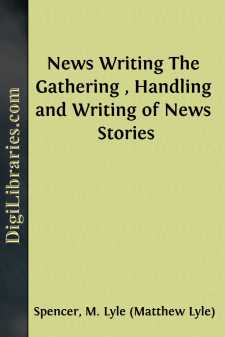Categories
- Antiques & Collectibles 13
- Architecture 36
- Art 48
- Bibles 22
- Biography & Autobiography 813
- Body, Mind & Spirit 142
- Business & Economics 28
- Children's Books 17
- Children's Fiction 14
- Computers 4
- Cooking 94
- Crafts & Hobbies 4
- Drama 346
- Education 46
- Family & Relationships 57
- Fiction 11829
- Games 19
- Gardening 17
- Health & Fitness 34
- History 1377
- House & Home 1
- Humor 147
- Juvenile Fiction 1873
- Juvenile Nonfiction 202
- Language Arts & Disciplines 88
- Law 16
- Literary Collections 686
- Literary Criticism 179
- Mathematics 13
- Medical 41
- Music 40
- Nature 179
- Non-Classifiable 1768
- Performing Arts 7
- Periodicals 1453
- Philosophy 64
- Photography 2
- Poetry 896
- Political Science 203
- Psychology 42
- Reference 154
- Religion 513
- Science 126
- Self-Help 84
- Social Science 81
- Sports & Recreation 34
- Study Aids 3
- Technology & Engineering 59
- Transportation 23
- Travel 463
- True Crime 29
News Writing The Gathering , Handling and Writing of News Stories
Categories:
Description:
Excerpt
I. INTRODUCTION
—The city room is the place where a reporter presents himself for work the first day. It is impossible to give an exact description of this room, because no two editorial offices are ever alike. If the reporter has allied himself with a country weekly, he may find the city room and the business office in one, with the owner of the paper and himself as the sole dependence for village news. If he has obtained work on a small daily, he may find a diminutive office, perhaps twelve by fifteen feet, with the city editor the only other reporter. If he has been employed by a metropolitan journal, he will probably find one large room and several smaller adjoining offices, and an editorial force of twenty to thirty or forty helpers, depending upon the size of the paper.
—The metropolitan paper, of course, is the most complex in organization, and is therefore the one for a beginner to examine. The chances are two to one that the cub will have to begin on a so-called country daily, but if he knows the organization of a large paper, he will experience little trouble in learning the less complicated system of a small one. For this reason the reader is given in Part I an explanation of the organization of a representative metropolitan newspaper.
—The reader is cautioned, however, against taking this exposition as an explanation of anything more than a typical newspaper. The details of organization of various papers will be found to differ somewhat. The number of editors and their precise duties will vary. One journal will be a morning, another an afternoon, paper; a third will be a twenty-four-hour daily, employing a double shift of men and having one city editor with day and night assistants. One paper will have a universal copy desk with a single copy editor handling all departments. Another will have, instead of a state editor, a section editor, a man who handles all special matter not carried by the press service from possibly half a dozen states. Thus the organizations vary in certain minor details, sometimes materially so; but, on the whole, one general system will prevail. And it is to give the student an understanding of a typical newspaper plant that Part I is written.
—As stated in the preceding chapter, the place at which the reporter presents himself for work the first day is the city room. Before coming, he will have seen the city editor and received instructions as to the time. If the office is that of a morning paper, he will probably be required to come some time between noon and six p.m. If it is that of an afternoon paper, he will be asked to report at six or seven a.m. Let us suppose it is a metropolitan afternoon journal and that he is requested to be in the office at seven, the hour when the city editor appears. The ambitious reporter will always be in his place not later than 6:45, so that he may see the city editor enter.
—When a reporter appears on his first morning, he will find a big, desk-crowded room, deserted except for two or three silent workers reading and clipping papers at a long table. These men are known variously as the gas-house gang, the lobster shift, the morning stars, etc. They are the reporters and copy readers who read the morning papers for stories that may be rewritten or followed up for publication during the day. They have been on duty since two or three in the morning and have prepared most of the material for the bull-dog edition, the morning issue printed some time between 7:00 and 10:00 a.m. and mainly rewritten from the morning papers. On the entrance of the new reporter they will look up, direct him to a chair where he may sit until the city editor comes, and pay no more attention to him. They, or others who take their places, edit all the news stories. They correct spelling and punctuation, rewrite a story when the reporter has missed the main feature, reconstruct the lead, cut out contradictions, duplications, and libelous statements, and in general make the article conform to the length and style demanded by the paper; and having carefully revised the story, they write the headlines and chute it to the composing room. On the whole, these men are the most unpopular on the force, since they are subject to double criticism, from the editors above them and the reporters whose copy they correct....


